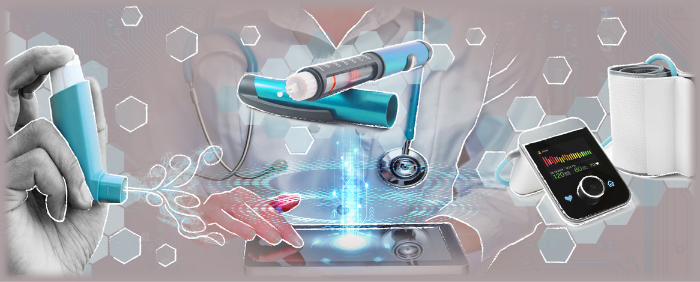As business gradually emerges from the constraints caused by the pandemic, we are seeing a significant surge of interest in the development of smart technologies, particularly for the medical and healthcare sector. Smart technologies when implemented into specific devices allow their users to take greater responsibility for their personal healthcare and can potentially provide valuable insights into ongoing health issues without the need for frequent consultations with medical practitioners. Smart innovation in healthcare means not only developing and adopting new products and technologies for diagnosis and treatment but also necessarily involves a greater degree of information exchange and better management of clinically relevant data.
At one end of the healthcare spectrum, a range of medical devices such as inhalers, insulin pens, blood pressure monitors, cardiac rhythm monitors, sleep therapy devices, and the like are being developed as smart devices. These devices can not only allow users to take increased responsibility but can also allow healthcare professionals to remotely monitor ongoing conditions, allowing observation and treatment that was previously only possible in a medical setting.
Similarly, at the other end of the spectrum, there is increasing interest in wellness devices, particularly wearables such as fitness trackers, smartwatches, and smart rings, that are increasingly used to assess overall health and fitness. Small lightweight devices, which are worn on the body, can monitor vital signs such as temperature, heart rate, and breathing rate, and may also provide insights into the early onset or progression of an illness.
What are the routes of successful development?
The routes for the successful development of both these classes of products are rarely straightforward. Companies need to understand how such devices will be used in ‘the real world, what are the important features that will make a successful product, and how they can effectively collect and feedback meaningful data from the devices. From a technical perspective, collection and analysis of data collected from these systems will require secure communication systems, and robust algorithms for data processing, but Cloud-based data collection hubs and ML/AI systems are likely to play increasingly important roles. There are already intriguing examples of how ML/AI systems can enable diagnoses from collected data even before the doctor, accurately predicting heart attacks or strokes, and potentially saving lives.
Our technology experts have extensive experience of working in these areas and are keenly aware of the issues that face technology developers. Most importantly for your project will be an understanding of how your collected data can be collated, analysed, and used to develop further insights of value to both the user and you. Can the data assist users to find increased value in the product, can it help them change behaviours or bring new benefits to their lifestyles?
This latter area is often completely new ground for companies that have been long-established players in a particular sector. Many companies that were traditionally developers/producers of physical products are having to transform away from their comfort zones and into the digital arena to be successful in a post-pandemic world. In this case, it is worth partnering with companies who have experience in how to successfully make this transition. We have developed several powerful tools, ranging from innovation workshops to learning exchanges to assist in the process – contact me if you’d like more information. Invariably our clients have been able to identify important learning points that have led to significant changes in product development and marketing.
Cost and efficiency
A further benefit of technological innovation in the healthcare sector is to reduce the general cost of production, and to improve the ease of use, resulting in commercial viability of products that were previously viewed as specialised medical products. For example, there have been significant developments in technology associated with assisted living solutions for the elderly and disabled, chronic care management systems, telehealth products for improving interactions between patients and caregivers.
In conclusion, we understand that smart innovation can have profound implications for companies developing products in the healthcare sector, but also appreciate the challenges faced by these companies. Firstly, the need to understand how smart innovation can be applied to make effective digital healthcare products, where the drivers are, where the benefits to the user arise, and how to maximise the overall utility of the product. And secondly, how these innovative technologies can be applied and integrated in practice, utilising the most recent technological advances to develop effective smart devices. We can provide a complete solution to the adoption of smart innovation and would love to hear from you about your business aspirations.

